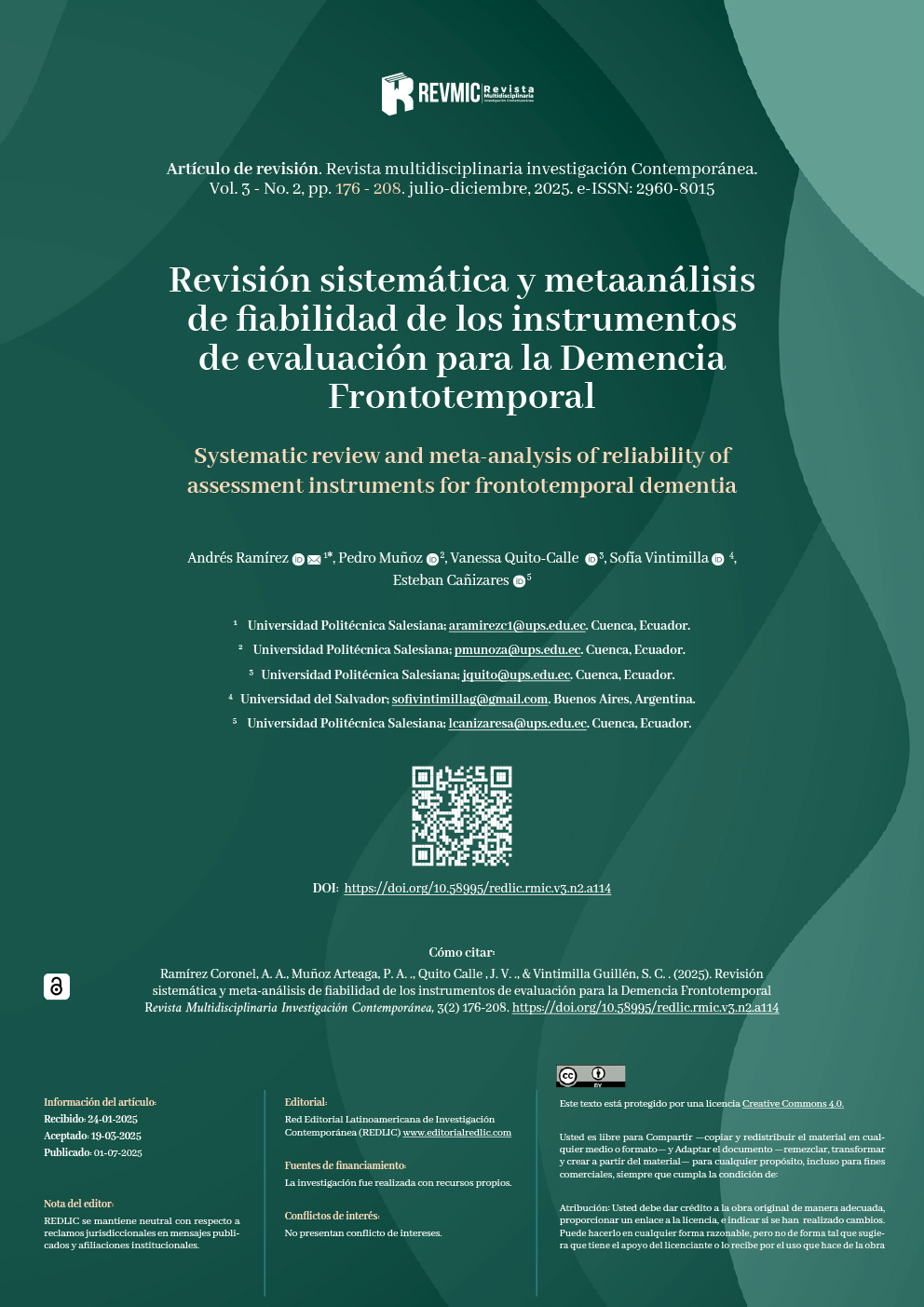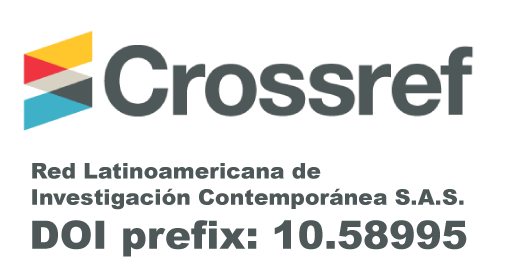Revisión sistemática y meta-análisis de fiabilidad de los instrumentos de evaluación para la Demencia Frontotemporal
Resumen
Introducción: La demencia frontotemporal (DFT) es una forma progresiva de demencia que afecta el comportamiento y la función cognitiva. La evaluación del conocimiento sobre esta enfermedad es crucial para el diagnóstico y tratamiento adecuado. Existen diversos instrumentos de evaluación que han sido adaptados y validados en distintos contextos culturales, pero su fiabilidad varía. Objetivo: Analizar la literatura científica sobre los instrumentos de evaluación utilizados para medir el conocimiento y la progresión de la DFT, con el fin de realizar un metaanálisis de la fiabilidad, centrándose en el alfa de Cronbach en diferentes adaptaciones culturales y contextos. Metodología: Se revisaron en cuatro bases de datos científicas (Web of Science, Scopus, PsycINFO y PubMed) sobre la fiabilidad (alfa de Cronbach) de instrumentos de evaluación de la DFT en diversas poblaciones. Se recopiló información sobre la población, el método de validación, el contexto cultural y la consistencia interna (alfa de Cronbach) de cada instrumento. Resultados: Los resultados mostraron que la consistencia interna de los instrumentos varía según el contexto. Por ejemplo, la FTDKS obtuvo un alfa de .846 en Estados Unidos, .740 en países hispanohablantes, y .800 en Polonia. La FTD-FRS mostró un alfa excepcional de .975 en Brasil. El modelo de metaanálisis (nEstudios = 3) demostraron una fiabilidad global de .85 (IC α = .80 - .90). Conclusión: Los instrumentos de evaluación de la DFT presentan variaciones en su fiabilidad en función del contexto cultural. Es esencial realizar adaptaciones adecuadas para mejorar su eficacia en la evaluación del conocimiento sobre la enfermedad, facilitando así un mejor diagnóstico y atención a los pacientes.
Descargas
Referencias
- Bang J, Spina S, Miller BL. Frontotemporal dementia. Lancet. 2015; 24;386(10004):1672–82. https://doi.org/10.1016/S0140-6736(15)00461-4. DOI: https://doi.org/10.1016/S0140-6736(15)00461-4
- Bott NT, Radke A, Stephens ML, Kramer JH. Frontotemporal dementia: diagnosis, deficits and management. Neurodegener Dis Manag. 2014;4(6):439–54. https://doi.org/10.2217/nmt.14.34. DOI: https://doi.org/10.2217/nmt.14.34
- Young JJ, Lavakumar M, Tampi D, Balachandran S, Tampi RR. Frontotemporal dementia: latest evidence and clinical implications. Ther Adv Psychopharmacol. 2018 Jan;8(1):33–48. https://doi.org/10.1177/2045125317739818. DOI: https://doi.org/10.1177/2045125317739818
- Hogan DB, Jetté N, Fiest KM, Roberts JI, Pearson D, Smith EE. The prevalence and incidence of frontotemporal dementia: a systematic review. Can J Neurol Sci. 2016 Apr;43(Suppl 1). https://doi.org/10.1017/cjn.2016.25 DOI: https://doi.org/10.1017/cjn.2016.25
- Mendez MF, Shapira JS, McMurtray A, Licht E, Miller BL. Accuracy of the clinical evaluation for frontotemporal dementia. Arch Neurol. 2007;64(6):830–5. https://doi.org/10.1001/archneur.64.6.830. DOI: https://doi.org/10.1001/archneur.64.6.830
- Leroy M, Bertoux M, Skrobala E, Mode E, Adnet-Bonte C, Le Ber I. Characteristics and progression of patients with frontotemporal dementia in a regional memory clinic network. Alz Res Therapy. 2021;13:19. https://doi.org/10.1186/s13195-020-00753-9 DOI: https://doi.org/10.1186/s13195-020-00753-9
- Cahill S, Pierce M, Werner P, Darley A, Bobersky A. A systematic review of the public’s knowledge and understanding of Alzheimer’s disease and dementia. Alzheimer Dis Assoc Disord. 2015;29(3):255–75. https://doi.org/10.1097/WAD.0000000000000102. DOI: https://doi.org/10.1097/WAD.0000000000000102
- Leszko M, Carpenter BD. Reliability and validity of the Polish version of the Alzheimer’s disease knowledge scale. Dement Geriatr Cogn Disord. 2021;50(1):51–9. https://doi.org/10.1159/000514872. DOI: https://doi.org/10.1159/000514872
- Lüdecke D, von dem Knesebeck O, Kofahl C. Public knowledge about dementia in Germany – results of a population survey. Int J Public Health. 2016;61(1):9–16. https://doi.org/10.1007/s00038-015-0703-x DOI: https://doi.org/10.1007/s00038-015-0703-x
- Pose M, Cetkovich M, Gleichgerrcht E, Ibáñez A, Torralva T, Manes F. The overlap of symptomatic dimensions between frontotemporal dementia and several psychiatric disorders that appear in late adulthood. Int Rev Psychiatry. 2013;25(2):159–67. https://doi.org/10.3109/09540261.2013.769939. DOI: https://doi.org/10.3109/09540261.2013.769939
- Finger EC. Frontotemporal dementias. Continuum. 2016 Apr;22(2 Dementia):464–89. https://doi.org/10.1212/CON.0000000000000300 DOI: https://doi.org/10.1212/CON.0000000000000300
- Caceres BA, Frank MO, Jun J, Martelly MT, Sadarangani T, de Sales PC. Family caregivers of patients with frontotemporal dementia: an integrative review. Int J Nurs Stud. 2016 Mar;55:71–84. https://doi.org/10.1016/j.ijnurstu.2015.10.016. DOI: https://doi.org/10.1016/j.ijnurstu.2015.10.016
- O’Keeffe FM, Murray B, Coen RF, Dockree PM, Bellgrove MA, Garavan H. Loss of insight in frontotemporal dementia, corticobasal degeneration and progressive supranuclear palsy. Brain. 2007 Mar;130(Pt 3):753–64. https://doi.org/10.1093/brain/awl367 DOI: https://doi.org/10.1093/brain/awl367
- Ducharme S, Dols A, Laforce R, Devenney E, Kumfor F, van den Stock J. Recommendations to distinguish behavioural variant frontotemporal dementia from psychiatric disorders. Brain. 2020;1;143(6):1632–50. https://doi.org/10.1093/brain/awaa018. DOI: https://doi.org/10.1093/brain/awaa018
- Wynn MJ, Carpenter BD. Frontotemporal dementia knowledge scale: development and preliminary psychometric properties. Alzheimer Dis Assoc Disord. 2020;34(1):59–65. https://doi.org/10.1097/WAD.0000000000000344. DOI: https://doi.org/10.1097/WAD.0000000000000344
- Leszko M, Zając-Lamparska L, Trempala J. Aging in Poland. Gerontologist. 2015;55(5):707–15. https://doi.org/10.1093/geront/gnu171. DOI: https://doi.org/10.1093/geront/gnu171
- Carvalho A, Rea IM, Parimon T, Cusack BJ. Physical activity and cognitive function in individuals over 60 years of age: A systematic review. Clinical Interventions in Aging. 2014;9:661–82. https://doi.org/10.2147/CIA.S55520. DOI: https://doi.org/10.2147/CIA.S55520
- Casaletto KB, Rentería MA, Pa J, Tom SE, Harrati A, Armstrong NM, Rajan KB, Mungas D, Walters S, Kramer J, Zahodne LB. Late-life physical and cognitive activities independently contribute to brain and cognitive resilience. Journal of Alzheimer’s Disease: JAD. 2020;74(1):363–76. https://doi.org/10.3233/jad-191114. DOI: https://doi.org/10.3233/JAD-191114
- Page MJ, McKenzie JE, Bossuyt PM, Boutron I, Hoffmann TC, Mulrow CD, Shamseer L, Tetzlaff JM, Akl EA, Brennan SE, Chou R, Glanville J, Grimshaw JM, Hróbjartsson A, Lalu MM, Li T, Loder EW, Mayo-Wilson E, McDonald S, McGuinness LA, Stewart LA, Thomas J, Tricco AC, Welch VA, Whiting P, Moher D. The PRISMA 2020 statement: an updated guideline for reporting systematic reviews. BMJ. 2021; 372. https://doi.org/10.1136/bmj.n71. DOI: https://doi.org/10.1136/bmj.n71
- Page MJ, McKenzie JE, Bossuyt PM, Boutron I, Hoffmann TC, Mulrow CD, Shamseer L, Tetzlaff JM, Akl EA, Brennan SE, Chou R, Glanville J, Grimshaw JM, Hróbjartsson A, Lalu MM, Li T, Loder EW, Mayo-Wilson E, McDonald S, McGuinness LA, Stewart LA, Thomas J, Tricco AC, Welch VA, Whiting P, Moher D. The PRISMA 2020 statement: An updated guideline for reporting systematic reviews. PLoS Med. 2021;18(3):e1003583. https://doi.org/10.1371/journal.pmed.1003583. DOI: https://doi.org/10.1371/journal.pmed.1003583
- Rethlefsen ML, Kirtley S, Waffenschmidt S, Ayala AP, Moher D, Page MJ, Koffel JB; PRISMA-S Group. PRISMA-S: an extension to the PRISMA Statement for Reporting Literature Searches in Systematic Reviews. Syst Rev. 2021;10(1):39. https://doi.org/10.1186/s13643-020-01542-z. DOI: https://doi.org/10.1186/s13643-020-01542-z
- Ouzzani, M., Hammady, H., Fedorowicz, Z. et al. Rayyan—a web and mobile app for systematic reviews. Syst Rev 5, 210 (2016). https://doi.org/10.1186/s13643-016-0384-4 DOI: https://doi.org/10.1186/s13643-016-0384-4
- Cho E. Neither Cronbach’s Alpha nor McDonald’s Omega: A Commentary on Sijtsma and Pfadt. Psychometrika. 2021;86:877–86. https://doi.org/10.1007/s11336-021-09801-1. DOI: https://doi.org/10.1007/s11336-021-09801-1
- Barchard KA, Hakstian AR. The Effects of Sampling Model on Inference with Coefficient Alpha. Educ Psychol Meas. 1997;57(6):893–905. https://doi.org/10.1177/0013164497057006001. DOI: https://doi.org/10.1177/0013164497057006001
- Higgins JP, Thompson SG. Quantifying heterogeneity in a meta-analysis. Stat Med. 2002;21(11):1539–58. https://doi.org/10.1002/sim.1186 DOI: https://doi.org/10.1002/sim.1186
- Wynn JC, Carpenter BD. Frontotemporal Dementia Knowledge Scale: Development and preliminary psychometric properties. Alzheimer Dis Assoc Disord. 2020;34(1):45–52. https://doi.org/10.1097/WAD.0000000000000344 DOI: https://doi.org/10.1097/WAD.0000000000000344
- Magrath-Guimet M, Martínez-Acosta F, Romero-López A. Spanish version of the Frontotemporal Dementia Knowledge Scale: Adaptation and validation. Arq Neuropsiquiatr. 2022;80(2):134–44. https://doi.org/10.1590/0004-282X-ANP-2020-0550 DOI: https://doi.org/10.1590/0004-282x-anp-2020-0550
- Turró-Garriga O, Bruna-Bosch X, Gutiérrez-Villarreal M. Adaptation and validation of a Spanish-language version of the Frontotemporal Dementia Rating Scale (FTD-FRS). Neurologia. 2017;32(6):386–94. https://doi.org/10.1016/j.nrl.2015.12.004 DOI: https://doi.org/10.1016/j.nrleng.2015.12.002
- Karasiewicz K, Leszko M. Psychometric properties of the Polish version of the Frontotemporal Dementia Knowledge Scale. Dement Geriatr Cogn Disord. 2021;50(1):123–34. https://doi.org/10.1159/000521143 DOI: https://doi.org/10.1159/000521143
- Lima-Silva TB, Ortega-Muñoz P, Rentería-Palma C. Validity and reliability of the Frontotemporal Dementia Rating Scale (FTD-FRS) for the progression and staging of dementia in Brazilian patients. Alzheimer Dis Assoc Disord. 2018;32(4):297–304. https://doi.org/10.1097/WAD.0000000000000246 DOI: https://doi.org/10.1097/WAD.0000000000000246

Publicado 2025-04-15
Palabras clave
- metaanálisis,
- fiabilidad,
- psicometría,
- demencia frontotemporal
Número
Sección
Derechos de autor 2025 Los autores que publiquen en la revista Multidisciplinaria Investigación Contemporánea aceptan los siguientes términos: 1. Los autores mantienen sus derechos de autor (copyright) y otorgan a la revista Multidisciplinaria Investigación Contemporánea el derecho de la primera publicación de su trabajo, bajo una licencia Creative Commons Attribution 4.0. Esta licencia permite que terceros utilicen el contenido publicado, siempre que se mencione la autoría y la primera publicación en esta revista. 2. Los autores pueden establecer acuerdos adicionales para la distribución no exclusiva de la versión publicada de su artículo en otros lugares, como repositorios institucionales, siempre y cuando se indique claramente que el trabajo fue publicado por primera vez en esta revista. 3. Los autores conservan sus derechos de autor (copyright) y garantizan a la revista Multidisciplinaria Investigación Contemporánea el derecho a publicar el manuscrito a través de los canales que considere apropiados. 4. Se permite y se recomienda a los autores compartir su trabajo en línea (por ejemplo, en repositorios institucionales o páginas web personales), una vez que el manuscrito haya sido aceptado para su publicación. Esto puede conducir a intercambios productivos y a una mayor y más rápida citación del trabajo publicado.

Esta obra está bajo una licencia internacional Creative Commons Atribución 4.0.



















